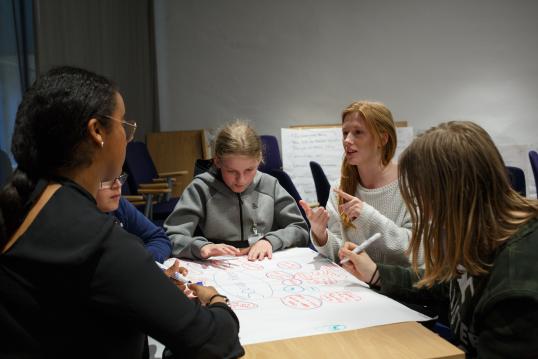- Topic
- Mobility management
- Public and stakeholder involvement
- Country
- Estonia
- Resource type
- Case study
First published on 4 June 2020.
A mobility campaign was prepared in Tartu (Estonia) which allowed 8th graders to implement a mobility project in their city. This case study was created as a part of the cities.multimodal project.
The 8th graders were given a creative assignment that they needed to execute individually during the school year.
The students could choose the framework for their creative assignments themselves resulting in assignments ranging from different art or research projects to organising an event. A four-class programme was prepared to educate students on mobility issues and project management with every class lasting for 90 minutes.
In action
The four-class programme featured a different topic or activity for each session;
- The first class was about transportation in everyday life, how transportation impacts the students and people around them and what impact it can have on the environment.
- The second class was about the four basic steps of project management; how to set goals, how to plan for resources, how to execute and how to measure the results. The students were divided into teams of 3-4 students to brainstorm about their projects.
- The third class was organised with mobility experts from the Tartu City Government. Prior to the session, students were given the assignment to refine their ideas, during the class they received feedback from the mobility experts. The experts provided feedback on the scope of the project, the possible impact, feasibility and pointed to issues that needed refinement.
- The fourth class allowed students to present their final ideas. Projects were given 3 minutes for presentation followed by a question and answer session. The projects were evaluated by a panel of five experts from the Tartu City Government and the Institute of Baltic Studies.
Results
Ultimately, eight individual projects were presented to the panel, and four projects were evaluated as feasible and good enough for implementation.
These four successful projects will be implemented in May 2020. Successful projects include;
- a car-free day
- a walking bus
- a drawing and video competition and;
- a bike and spares fair.
The total budget to implement the ideas is €5,000 euros which is partially funded by the cities.multimodal project and partially by the city budget. The results of the projects are measured by the students. A traffic counter on the Vanemuise street in the proximity of the school is used to count the numbers of pedestrians, cyclists and private cars and evaluate the effect of the campaign.
Depending on how well the campaign and the measures perform, the city will decide if the campaign should be continued next year in M.Reinik’s or other schools. The results will be presented on the city’s and the school’s websites.
Challenges, opportunities and transferability
The project is an extracurricular activity for the school and teachers are not prepared or assigned to educate the students on mobility issues. Mobility specialists are usually not experienced in managing 8th graders. The implementation needed professional educators in order to motivate and keep the 8th graders engaged. A set of skills that the city officials clearly lacked! Therefore, communication with the 8th graders was done directly through the school's director and the teachers. The measures implemented by the students have been communicated through personnel channels, the school’s official channels, teachers and activity leaders, school’s official mailing list, posters as well as social media.
In Depth
This case study was created as a part of the cities.multimodal project and based on a report by kaspar [dot] alev raad [dot] tartu [dot] ee (Kaspar Alev), City of Tartu.
raad [dot] tartu [dot] ee (Kaspar Alev), City of Tartu.

